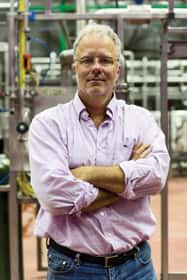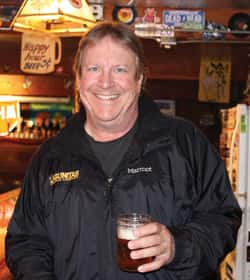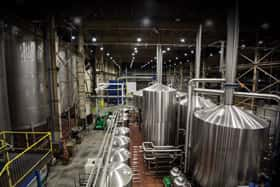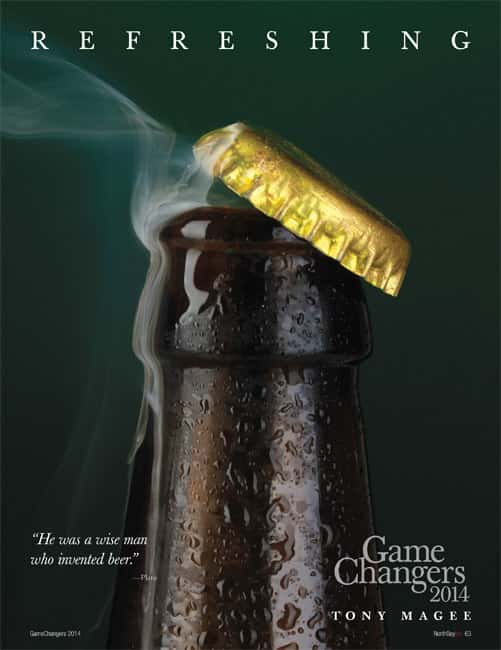“He was a wise man who invented beer.” —Plato
The day before he was to meet with the Teamsters union in Chicago, Tony Magee was inspecting his new, 300,000-square-foot Lagunitas Brewing Company facility in that city’s Douglas Park neighborhood. The founder, CEO and president of the Petaluma-based brewing company was tightening clamps while trying to locate a pesky air leak in a production line.
“When opening a new plant like this, well, now begins the process of discovering what doesn’t work quite right,” he says. Only a few days later, the beers for which Lagunitas has become famous were being bottled at the facility, and Magee was keeping the outcome of the meeting with the Teamsters to himself, citing ongoing negotiations.
Magee, who grew up and attended college in the Chicago area, says it’s been great to go back. “But in a weird, 25-years-later sort of way. There’s something nice about being bicoastal. Chicago is a cool city in its own right, and the difference between it and Sonoma County is night and day.”
Magee went from making a mess of his wife’s kitchen with a home beer brewing kit in 1992 to running two breweries that together could produce 53 million gallons of craft beer annually by 2016. Along the way, he’s amassed thousands of loyal Lagunitas beer fans and built a sizable Twitter following that would be the envy of most growing companies.
One recent Magee tweet: “Now that flawless beer is starting to flow from the bottling line in Chicago, I’m reflecting on the miracle that we all just lived through.”
 Changing the beer game
Changing the beer game
Magee, 54, seems pleased to be recognized as a game changer. “The notion of changing the [brewing] game is something I’ve always thought a lot about. I love the industry, but how do you enter a crowded marketplace and find a way to act without the competition cramping your style? You change the game. And, if you’re lucky, you succeed and it plays out.”
It’s most definitely played out for Magee. Last year, the Brewers Association (BA) ranked Lagunitas at No. 5 on its list of the Top 50 U.S. craft brewing companies––one notch higher than the year before––based on sales volume. (By comparison, Chico-based Sierra Nevada Brewing held the No. 2 position in 2013.) The BA also ranked Lagunitas at No. 11 for overall beer sales volume in the nation in 2013; the top three companies on that same list were Anheuser-Busch, MillerCoors and Pabst.
This year, Magee predicts Lagunitas will produce a bit more than 600,000 barrels of beer in its two plants combined, or approximately 18.6 million gallons––a significant increase from 420,000 barrels in 2013. (A barrel is 31 gallons, he says.)
Mention the BA’s sales rankings to Magee and he feels the need to clarify. “The Brewers Association’s definition of craft brewing is convoluted, with ‘special this’ and ‘special that,’” he says. “We used to be called microbreweries, but we got so big that ‘micro’ didn’t work anymore. The BA kept raising the limit of how much beer we could make and still be called a craft brewery. It works so hard to define ‘craft’ that it makes it increasingly meaningless and weakens it by naming it.”
 A prolific tweeter
A prolific tweeter
With the opening of the Lagunitas plant in Chicago, Magee has been in the media spotlight more than ever, and he seems a bit uncomfortable with all the fuss. “Everyone at the brewery is kind of shy and unassuming,” says Ron Lindenbusch, chief marketing officer at Lagunitas and a long-time friend of Magee’s. “When you get all the media attention, it’s a little weird. It’s strange to figure out how to word things right. Tony’s not uncomfortable with the media, but he is uncomfortable with the possibility of being misunderstood and misquoted.”
Magee seems far more at ease posting his thoughts on Twitter when the mood strikes, tapping out bursts of candid creativity. He shares photos (including what’s resting on his airplane tray table), admits to drunk tweeting, quotes passages from Walt Whitman and scenes from the movie “Blade Runner,” and drops the f-bomb occasionally. He has 19,500 followers on the social media site, yet doesn’t follow a single individual or company.
“As a business, we try not to follow others on Twitter, so we find our own voice,” says Magee. “Initially, I wanted to do a mini-blog on Twitter. Then I felt like I had to respond to everyone, which became overwhelming.” But he’s pleased to note that he gets retweeted from time to time.
In 2012, Magee also felt the need to record his saga in his own words, with the publication of The Lagunitas Story: So, You Want to Start a Brewery…? Sold on the company’s website, the book is described as “64,420 words of mumbling,” a nod to the off-kilter company slogan “Beer Speaks, People Mumble.”
No succession plan
When speaking (he doesn’t mumble), Magee frequently switches between “I” and “we” to describe the brewery’s history, culture and future. Yes, Lagunitas is his company––he built it and will die still running it, he says. But Magee and his hundreds of employees, some of them relatives and close friends, are also the “we” of which he speaks.
“My wife works at the Petaluma brewery doing all the logistics, filling orders and making certain the right beer shipment is at the right dock,” he says. “My sister works there and all three of my nieces, and my wife’s niece’s husband. But there’s no succession plan. I’m on the die-on-the-payroll plan, because if you sell your business, you sell all of your best friends’ careers along with it. I couldn’t consciously do that.”
From the beginning, Magee has been keenly involved with everything that goes on in the company, says Lindenbusch. “We want to grow and be a large company without having a rigid corporate structure, and that’s difficult. The way to do it is to keep someone like Tony in the ultimate decision-making position forever. We set the tone and want everyone to understand that is the tone.
“We’re not here to sell a case of beer, we’re here to make a friend. Tony has always had that sort of attitude about how to run and own a company. He thinks about humanity first and profits second. Lagunitas is still kind of a mom-and-pop shop, and to the people who drink our beer, that’s refreshing.”
Magee adds his own perspective: “Lagunitas has been a low-friction environment to grow a business in, and it still is.”
Despite his low-friction, low-key way of conducting business, Magee has contributed substantially to the economic health of the North Bay. “Tony has played a crucial role in Sonoma County by creating jobs and a visible brand known throughout the region, and by bringing large numbers of visitors to the brewery for tours and events,” says Ben Stone, executive director of the county’s Economic Development Board, adding, “He makes it all seem easy and does it with a marvelous sense of humor.”
Lagunitas also follows a nontraditional marketing approach, says Lindenbusch. “We don’t send out press releases. We don’t beat our chests. Our marketing is about relationships. We market our beer through events and parties and hosting fund-raisers and inviting people to the brewery. It’s more unconventional, but it works.”
An excerpt from Magee’s book provides further insight into the Lagunitas marketing philosophy: “…even if we were to accidentally win a medal at the GABF [Great American Beer Festival], I wouldn’t make a big deal out of it with posters or advertisements. Some beer companies will, and that’s cool for them, but it’s not important to us. I mean, if you win, it doesn’t mean you’ll succeed. If you lose, it doesn’t mean you’ll fail. So why not just avoid the background noise altogether and get back to work?”
 Chicago vital for shipping
Chicago vital for shipping
Opening the Chicago plant has been Magee’s main focus––and his home away from home––for the past year. “I’ve pretty much been in Chicago since last August. At first, I’d fly home on Saturday morning thinking I could stay for a while, and then I’d have to be back in Chicago the following Tuesday for meetings or something. So I have a condo there and bought a car and some clothes.”
He’s also moonlighting there as a musician. An accomplished guitarist and songwriter, Magee reconnected in Chicago with two college friends, a bass player and drummer, to form a trio called Alice Drinks the Kool Aid. They recently performed their original tunes at a Chicago nightclub and made an appearance earlier this year at the South by Southwest Festival in Austin, Tex.
“That’s just who he is,” says Lindenbusch, one of the brewery’s first employees. “When times were tough in the early days of the company, Tony wouldn’t stress about it. He’d pick up a guitar and start playing. The music is what he does for fun––it’s just another part of his life.”
Chicago is a major crossroads in the nation when it comes to shipping, says Magee, which is part of the reason he chose it for the second brewery. “And the plant in Petaluma was growing so quickly that we needed a larger facility than we first thought. The original budget for the Chicago plant was $18 million, but it ended up costing $36 million.” Chicago is also vital for shipping the beer to Europe via the St. Lawrence Seaway, he adds. “We’ll be sending more of our product to London soon.”
Located west of downtown Chicago, the brewery site had been part of a complex that served as a warehouse for fabricated steel products. “It was an enormous, six-acre shell,” says Magee. During the process of turning it into a brewery, he discovered there wasn’t much difference between Petaluma and Chicago in regard to construction regulations and working with city officials. “Breweries are unique little creatures when it comes to industrial operations. Petaluma had never seen one before us, and modern Chicago doesn’t have much experience with big breweries.”
Many of Chicago’s large-scale breweries were destroyed in the Great Fire of 1871, he explains, and when the dust settled, they’d rebuilt in places like St. Louis and Milwaukee. “So the miracle is that the decision makers in Chicago wanted Lagunitas and were willing to trust us, and we found ourselves able to operate in a way that was similar to being in a small town, with some of the same family feel.”
Planning a third plant
Magee will begin scouting locations for a third Lagunitas brewery when the Chicago plant is operating at full speed, he says. “The third plant will be the beginning of someday having a dozen. You put the product close to the point of sale. Anheuser-Busch has 12 breweries in the United States. Putting plants in different parts of the country lets us build personal relationships in each place, because beer is personal.”
Magee hopes the third brewery can be in a “lovely” spot, like Petaluma. “But geography will matter relative to transportation. Chicago was an easy choice because we have the demand there for the beer, and I’m from there and know the city. I don’t know, say, Newark. So deciding the next location will take some time.”
Meanwhile, Magee plans to continue working hard to make sure people want to drink Lagunitas beer. “Frankly, I want to be in the serious beer business and put my beer on the shelves next to Heineken and Corona.”
Never forgetting his humble beginnings, Magee tweeted during the first tentative days of beer production in Chicago: “…it seems like almost yesterday that I scraped $750 together to buy my first 16 used kegs. Thanks for this rocket ride, beer lovers!”
A long, strange trip
1992: Tony Magee uses a home brewing kit to cook the first batches of beer in the kitchen of his home in Lagunitas (in rural Marin County).
1993: After perfecting a few recipes, he visits bars and restaurants in Marin County to drum up business for his keg beer, licensed under the Lagunitas name. The first beers sold are the Pale (later to become DogTown Pale), the Red (soon to be released again as one of the brewery’s seasonal brews called Imperial Red) and Wheat.
1994: Lagunitas Brewing Company, now housed in a small facility in Forest Knolls, produces 700 barrels of beer.
1995: The brewery moves into a larger space on Ross Street in Petaluma, where it produces 2,800 barrels and introduces its flagship beer, India Pale Ale.
1996: In its first full year of bottling, Lagunitas produces 7,800 barrels and rolls out a new beer called Maximus Ale.
1999: The brewery moves to its current location in Petaluma, at 1280 N. McDowell Boulevard, a short distance from the Ross Street location.
2000-2004: As demand for its beer increases, the brewery continues steady growth and expansion, and production reaches 27,000 barrels by 2004.
2006: The brewery is shut down for 20 days by state alcohol officials after undercover agents witness marijuana use onsite. Magee turns the negative experience into a positive business move by introducing a beer called Undercover Investigation Shut-Down Ale.
2010: Lagunitas leaps into the Top 20 list of the largest craft breweries in the nation by sales, as ranked by the Brewers Association (BA). The brewery posts sales of $25 million, earning the BA’s No. 17 slot.
2011: Lagunitas produces more than 160,000 barrels of beer and sales soar to $39 million. Its beers are now distributed in 32 states and Magee employs nearly 100 workers.
2012: The brewery undergoes a $15 million expansion that quadruples its production capabilities to 360,000 barrels per year. As it rises to No. 6 on the BA’s list of largest craft breweries, Magee announces plans to open a facility in Chicago.
2013: Construction on the Chicago brewery gets underway, and the BA bumps up Lagunitas to No. 5 on its list of largest craft breweries.
2014: The Chicago brewery begins production in April. It’s expected to boost the company’s capacity from 500,000 barrels annually to as high as 1.7 million barrels per year by 2016. Lagunitas beer is now available in 38 states and Canada. In May, the company adds its 485th employee and Magee forecasts revenues of $150 million by year’s end.
Expanding into Agriculture
Using the Lagunitas approach to nontraditional marketing, Magee simply posted a couple of tweets in April to announce the brewery’s acquisition of 20 acres of farmland adjacent to the plant: “In Petaluma the 20ac farm behind us came up 4sale. Was worried someone would buy it to build a McMansion & then complain about the brewery…” “…so we bought it! Meet the new LagunitasAgOperations…”
There are seven steers, about a dozen sheep and quite a few chickens already grazing on the land, says Magee, and vegetables will be grown, as well. “The property had been sitting idle for the past decade, but we’re going to use it as part of the brewery,” he adds. “It’s a downstream ag product, so having an ag component is pretty natural for us, and it’s beautiful, too. We have a number of employees who grew up on dairies, so it’s a dream for them.”
Author
-

Jean Doppenberg is a lifelong journalist and the author of three guidebooks to Wine Country.
View all posts




